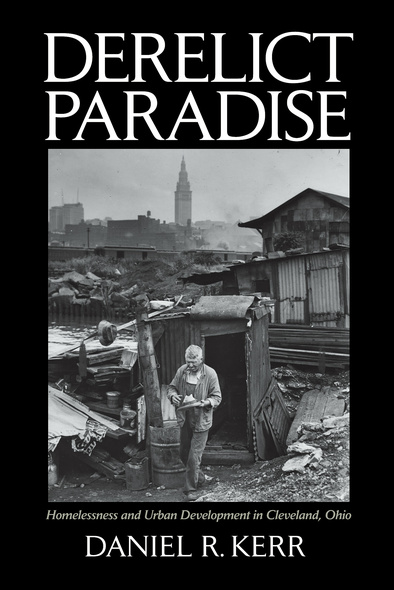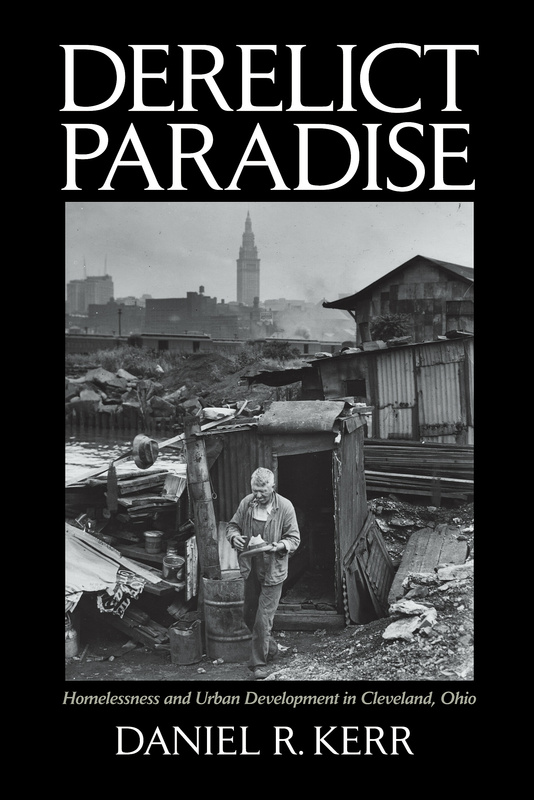Derelict Paradise
Homelessness and Urban Development in Cleveland, Ohio
University of Massachusetts Press
Seeking answers to the question, "Who benefits from homelessness?" this book takes the reader on a sweeping tour of Cleveland's history from the late nineteenth-century through the early twenty-first. Daniel Kerr shows that homelessness has deep roots in the shifting ground of urban labor markets, social policy, downtown development, the criminal justice system, and corporate power. Rather than being attributable to the illnesses and inadequacies of the unhoused themselves, it is a product of both structural and political dynamics shaping the city. Kerr locates the origins of today's shelter system in the era that followed the massive railroad rebellions of 1877. From that period through the Great Depression, business and political leaders sought to transform downtown Cleveland to their own advantage. As they focused on bringing business travelers and tourists to the city and beckoned upper-income residents to return to its center, they demolished two downtown working-class neighborhoods and institutionalized a shelter system to contain and control the unhoused and unemployed. The precedents from this period informed the strategies of the post–World War II urban renewal era as the "new urbanism" of the late twentieth century. The efforts of the city's elites have not gone uncontested. Kerr documents a rich history of opposition by people at the margins of whose organized resistance and everyday survival strategies have undermined the grand plans crafted by the powerful and transformed the institutions designed to constrain the lives of the homeless.
A tightly argued, effectively researched, and well-written book. Kerr successfully brings the voices of the unhoused and unemployed into his story at every turn, making a convincing case for their role in altering, if rarely determining, policy.'—Mark E. Santow, coauthor of Social Security and the Middle Class Squeeze
'One of the most robust portraits available of homelessness both as an institutional-spatial condition and as a human experience that changes over time.'—Joseph Heathcott, coeditor of Beyond the Ruins: The Meanings of Deindustrialization
'Basing his book on extensive archival research and oral histories, historian Kerr uses a broad lens to examine homelessness in Cleveland. . . . Recommended.'—Choice
'[Derelict Paradise] fills the gap in the historiography of American cities by situating homelessness firmly within the context of the rise and decline of American downtowns, inner-city neighborhoods, and industries.'—Ohio Valley History
'The history of homelessness, as well as that of poverty in general, is too often narrated from the top down, in studies of policies enacted by officials hoping to control the poor even while assisting them. Kerr's inversion of this paradigm and focus on the perspective of the homeless leads him to reject the standard liberal praise of relief programmes, and to argue that the answers to the problems of the homeless cannot be found until the homeless are afforded a significant role in developing relevant plans and programmes. With this provocative perspective, Derelict Paradise will inspire lively discussion in graduate courses in urban history, sociology, and policy development.'—Socialist History Society 42
'Daniel Kerr's book is thought-provoking and well-researched, as is to be expected of any academic endeavor. Where Kerr's book transcends those expectations is the manner in which he takes such a difficult topic to historicize and brings an honestly human element into the narrative. Homelessness is an uncomfortable topic for many Americans to consider. When they do, their considerations are often in passing and fraught with prejudices and oversimplifications. Daniel Kerr's book makes short work of such ideas, and confronts much harder truths about a society that produces those ideas to begin with by examining the systems in which they manifest, and exposing their architects and their accomplices to the light of historical perspective in the process.'—Northwest Ohio History
'Kerr argues for the benefits of engaging deeply with a local perspecitve. Only through this lens, he argues, is it possible to link stuctural change and everyday social relations.'—Labour/Le Trevail
'Derelict Paradise was written with deep insights into the experience of homelessness, yet also lays out the plans, programs, policies, and practices designed by decision makers. And while Kerr's sympathies seem to lie with the poor rather than the persons making the decisions, he is careful to point out, the primary actors believed they were making the right decisions for the good of the community and usually did not intend to perpetuate social injustice. . . . For anyone wanting to learn about the causes and history of homelessness in the United States, Derelict Paradise is indispensable.'—Street Sense
'Derelict Paradise ranges outside the boundaries of a social history of the homeless. Scholars of housing, labor, poverty, and urban development may find Cleveland's experience to be a confirmation of a challenge to national narratives. . . . A century ago, Cleveland's Chamber of Commerce connected the city's low cost of living and generous welfare benefits with 'the unenviable reputation of being a paradise for derelicts and undesirables.' As American cities reinvent themselves as havens for the so-called creative class, Kerr's book reminds us of the deep roots of this panacea and its social cost.'—H-Urban
'Kerr has offered a clearly argued, well-researched history deeply sensitive to the perspective f the marginalized working class. This book successfully illuminates the state's consistent ambivalence, counterproductive policies, and, at times, unnecessary cruelty toward the homeless. Uncovering resistance also restores crucial dignity for those shunted to the margins of society, and this book is an essential work in that important historical effort.'—American Historical Review
'The great strength of this book, apart from its careful placing of housing within the broader political networks of a proud North American industrial city, is to demonstrate convincingly that homelessness is something produced in the normal workings of urban commerce.'—Labour History
'Derelict Paradise relies heavily on painstaking research into the records and archives of Cleveland, as well as in person interviews with the key players in the homeless and homeless advocate community currently. Throughout this work, Kerr endeavors to answer the question he poses in the conclusion, 'who benefits from institutionalized homelessness?' He works hard to show the reader the answer to this question. The answers aren't easy, but then, neither is homelessness.'—Northeast Ohio Coalition for the Homeless
'Kerr persuasively argues that the elite control of relief agencies, the promotion of social control via a differentiation between the 'deserving' and the 'undeserving' poor and the increasingly close relationship between industry and the city's employment agency helped to create a pool of casual workers that were particularly vulnerable to homelessness.'—Ethnic & Racial Studies
'In considering the example of Cleveland in the past as a city worthy of our scrutiny, Derelict Paradise has provided an important starting point to inform our thinking today. And as we consider looking to the next fifty years, we owe a debt of gratitude to Kerr, who in writing this book, performs an extremely valuable service by sifting through the primary research sources and complex threads of Cleveland history. His work tells us that a twenty-first-century city with a shrinking population, aged housing stock, creeping suburban poverty, and uncontrolled expansion can undo the dysfunction of a past if leaders understand the themes and sources of negative policies and practices.'—Contemporary Sociology
Daniel R. Kerr is an assistant professor of history at American University.





